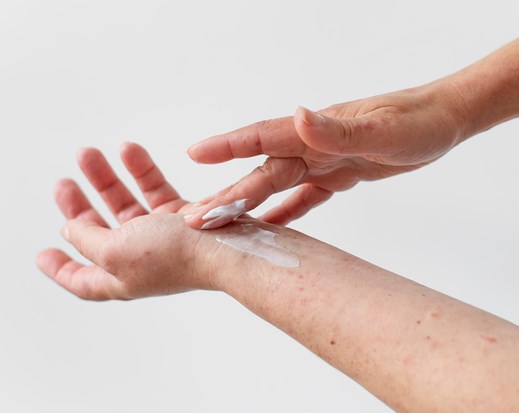



Eczema is a non-infectious dermatitis that causes the skin to dry and itchy and can occur at any age but is more common in children. Eczema lasts a long time and can sometimes increase in intensity. It may occur as a result of a genetic change affecting the skin, so that the skin becomes less able to retain moisture, protect against allergic bacteria and irritants, trigger an immune system response, and cause the occurrence of dermatitis, and people are at risk of food allergies, asthma, and hay fever. Psychological pressure can stimulate and trigger eczema attacks.
Symptoms:
1- Dry and cracked skin
2- Rash
3- Intense itching
4- Skin Color Change
5- Appearance of crusts on the skin
Complications
- Asthma and hay fever
- Food allergies
- Appearance of itchy skin peels
- Change in skin color
- Allergic Seam Dermatitis
- Sleep Problems
- The possibility of bacterial and viral infections.
Common skin irritants include:
1- Coarse woolen cloth
2- Dry Skin
3- Skin Infection
4- Free and Race
5- Dust
6- Tension
7- Cleaning Materials
8- Pet Needle
9- Pollen
10- Perfumes
Types of Eczema:
1. Fatty eczema
It is a common condition that affects the scalp or fatty areas of the body such as the nose, eyelashes, and eyebrows and ear, and causes itching, redness, and cortex
2. Sweating eczema
Their backs are fingers, feet, and palms.
3. Eczema Disc
They appear in the form of flaky red tablets that cause itchy skin
4. Chronic simple sensitivity
Prevention
- Take care to wear cotton clothes and avoid synthetic fabrics
- Moisturize skin at least twice a day
- Take a bath or wash daily
- Use a cleaner that does not contain soap or perfume
- Relieve psychological stress.
- Avoid the types of foods that cause the appearance of eczema
- Do not rub skin harshly when drying or bathing
- Cold compresses
- Over-the-counter conditioner preparations
When to visit a doctor
If symptoms continue to appear despite being cared for or when you see the effects of infection, such as red lines, skin secretions, or yellow crusts, we advise you to go for a medical consultation.
FAQs:
1) What is a spot test?
For testing, substances suspected of sensitizing the patient are added to a patch resembling adhesive tape and placed on the patient's back where there is no eczema. The patch remains for 48 hours and then is removed. The doctor reconsiders the location of the patch to see where the substances caused irritation to the skin and then confirms the patient's sensitivity to it.
2) Are adding substances such as sodium bicarbonate, chlorine, salt, or vinegar to bath water treated with eczema?
The addition of these substances is not useful in the treatment of eczema, but the use of oils or vaseline on the body after showering and skin wet is useful.
3) Is eczema a hereditary disease?
Eczema itself is not a genetic disease, but there is a genetic element in eczema infection. The presence of allergic conditions in the family, such as asthma or allergic rhinitis, is a risk factor for eczema.
4) Is the child with eczema definitively cured?
Eczema is a chronic disease, so its seizures will be repeated, and parents should avoid stimuli and use prevention as much as possible to reduce eczema bouts.
Early symptoms Of Multiple Sclerosis